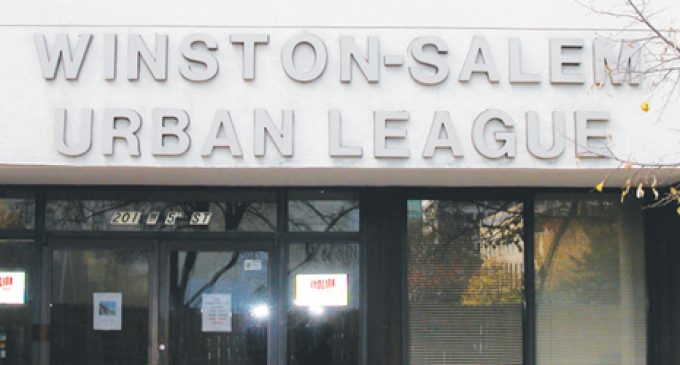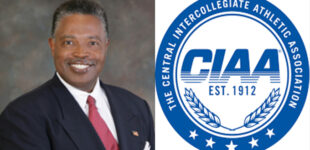Urban League: Black W-S lags

A 25-page report measures how black residents are doing compared with white residents
Each year since 1976, the National Urban League has released a report known as the “State of the Black America” to spark conversations and promote equality in economics, employment, education, health, housing, criminal justice and other areas of concern.
Since the first report was released 41 years ago, the “State of Black America” has provided hard evidence, including complete data sets, and expert analysis statistics on how blacks compare with whites in America. While it’s always good to know where black Americans stand on the national level, last month James Perry, executive director of the Winston-Salem Urban League (WSUL), ignited the local conversation when he released his collection of data, “The State of Black Winston-Salem.”
The 25-page report has been in the works since 2015, and measures how black residents are doing compared with white residents in areas of health and wellness, social justice and civil rights, education equity and economic and asset equality.
During an exclusive interview with The Chronicle last week, Perry discussed the report and what it means. The Chronicle also reached out to other leaders in the community to discuss the data.
Perry said the data in the report is guided by the Urban League’s mission to uplift disadvantaged communities and improve their opportunities. Data sets in the report were compiled from several different places, including the National Urban League, U.S. Census Bureau, City of Winston-Salem, Project Impact and the Winston-Salem Police Department.
Health & Wellness
The data set on health focuses on several categories: uninsured rates, death rates due to disease and food insecurity. The reports also show statistics on the murder rate of black and white residents.
Insurance is key because most Americans can’t afford medical costs. In Winston-Salem, black residents are almost 50 percent less likely than white residents to be insured, which translates to less healthy African-Americans and communities. When it comes to death rates due to disease, blacks have extremely high death rates in heart disease; prostate cancer; diabetes; septicemia, or blood poisoning, especially that caused by bacteria or their toxins; and nephritis, or inflammation of the kidneys, which are all treatable.
The number of black residents without insurance could be worse in the near future, especially if Republican senators get their way. Earlier this week, more than 200 people gathered outside the local office of Sen. Richard Burr to protest the GOP health care bill. If passed, even more black residents will be uninsured.
Early numbers show more than 22 million people could lose their health care coverage if the GOP health care bill is passed.
It’s no secret that access to fresh produce and healthy foods for residents in poverty stricken areas can be hard, and the numbers prove that. African-Americans in Winston-Salem are 50 percent less likely to have access to healthy food choices and five times more likely to rely on SNAP (Supplemental Nutrition Assistance Program).
There are several programs already in place to improve the access to fresh fruits and vegetables and others are in the making. The city has waved zoning laws to make it easier to create community gardens, and just last month city officials broke ground on Hydroponics Aquaponics Urban Farming Center near Kimberly Park and Martin Luther King Jr. Recreation Center. Hydroponics is the process of growing fruits and vegetables without using soil. Aquaponics involves farming fish that can provide nutrients for plants to grow.
City Council Member Denise “D.D.” Adams who is running for the 5th Congressional District Seat, pushed for the partnership with H.O.P.E (Helping Our People Eat) to build the new facility that will provide meals and produce for families in need and offer classes on urban farming.
“North Carolina is one of the top states in the nation for food disparities. We have a lot of great organizations that work on this initiative, but you have to know that’s not enough,” said Adams. “We have to start showing our community how to fish for themselves, and that’s what Hydroponics-Aquaponics will do.”
Perry said while urban farming is a great idea for the community, the community shouldn’t let grocery stores off the hook so easily. He said, “East Winston is an amazing community and there is no reason to not want to be of service to this community.
“I think the innovative ideas are great, but I don’t think we should give up on the idea that we can get more than two grocery stores in that community.”
Another important factor when discussing health and wellness in the African-American community is murder. In Winston-Salem, black residents are five times more likely to die from homicide than white residents. Dr. Kimya N. Dennis, a sociologist and criminologist who heads the criminal studies program at Salem College, and is an expert in mental health and suicide, said although most people in the black community don’t consider murder as mental health issue, it’s time they did.
“The Number One cause of death for black men between the ages of 15-35 is homicide, and the work I do addresses how some of these homicides are linked to suicide and what it means when someone continuously puts themselves in situations in which they might die. That’s a form of suicide,” Dennis said.
Dennis said over the past decade, there has been more research done at the national level on the connection between black violence and mental health. She said it’s a common belief that black people don’t kill themselves, but suicide impacts us all. Dennis mentioned people who believe they are dying for a larger cause can be considered suicidal as well. According to Dennis, the form of suicide is called altruistic suicide. As an example, Dennis mentioned gangs, and others who are involved in street violence.
“We can think of many examples in black communities where people are feeling pain mentally and emotionally and they go into situations where they’re trying to cry out and the way they cry out can also be a way to hide what’s going on in the inside,” she continued. “Mental health is not about being a bad person. Homicide doesn’t always have to be about being a bad person. There can be deeper issues going on.”
Social Justice & Civil Rights
In 2016, the WSUL partnered with several organizations, nonprofits, and the Winston-Salem Police Department to host a series of Black & Blue Town Halls designed to cultivate the relationship between police and the community. During the series of town halls, many black residents complained about the number of arrests during traffic stops for non-violent offenses related to improper documentation.
Despite only making up 34 percent of the total population of Winston-Salem in 2015, black residents accounted for 48 percent of all traffic arrests. In the data set, any time an individual received a citation or ticket, a data point for “arrest” was recorded.
When looking at the data set provided by the WSPD 2015 Annual Statistical Report, it is also important to note that figures do not note the total number of arrests for one individual. An individual may be arrested for more than one matter during an incident. For example, an individual can be arrested for speeding and having expired registration, which could result in two data points.
While admitting the data was imperfect, Perry raised questions about the police departments patrol assignments. He also said some cases, especially for traffic violations for improper documentation, could equate to “criminalizing poverty.”
He said, “We believe if we drill down where these arrests happen, we bet we will find that the majority happen in low-income communities, and a lot of times they’re trying to make the decision about whether they pay for groceries or get a new registration for their vehicle.”
Effrainguan Muhammad, local leader of the Nation of Islam, said while there is a need for a police presence in the community, it is equally important for community members to take care of their neighborhood as well. Earlier this month, Muhammad and other members of the Local Organizing Committee hit the streets and called for an end to gun violence and a gang truce.
“It’s definitely two-fold. The police have a responsibility but we have a responsibility to make our community a safe and decent place,” said Muhammad. “If we make our communities safe, there is no need for a police presence.”
After hearing the arrest numbers for black residents, Muhammad also discussed the connection with poverty. He echoed Perry’s sentiments on the criminalization of poverty. He said in some cases the police force is being used as a revenue collection company.
He said, “A lot of times poor people don’t have the means to afford registration and insurance, so they have to take a change to survive.”
Education Equity
According to Perry, the data collected from Project Impact on educational attainment is the most frustrating. During the 2015-2016 school year, only 27 percent of African-American third-graders in the local school district were reading at grade level compared with 68 percent of their white counterparts. High school scores aren’t much better. Thirty-one percent of black students passed the English II exam while 67 percent of white students passed.
Only 27 percent of black third-graders in Winston-Salem/Forsyth County Schools performed math at grade level, and only 21 percent black high-schoolers achieved Math I proficiency. Meanwhile, 70 percent of white third-graders and 65 percent of white high school students passed state testing requirements.
In his report, Perry wrote, “Financial supplementation is an essential step to bridging the education attainment gap.” Although he admits he has not sat down with Superintendent Beverly Emory or members of the school board, Perry said the local school system has a history of paying more benefits to middle- and upper-income students, while schools with high poverty rates suffer.
In 2015, the federal government informed Emory that 11 schools in the district needed to adopt reform models. The schools – Cook, Ashley, Easton, Forest Park, Petree and Kimberly Park elementary schools; Mineral Springs Middle School, Philo-Hill Magnet School; Carver and Kennedy high schools and Winston-Salem Preparatory Academy – all have a majority minority populations.
“We need to fundamentally transform the public-school system and how it provides for all students but especially African-American students. And if we don’t, we’re in for an absolute tail spin,” said Perry. “There are a lot of numbers in this report that are shocking and scary, but that is the scariest. We are one of many voices on this issue. This is a real wake up call for this community.”
Rhonda Mays, longtime educator in the Winston-Salem/Forsyth County Schools district and president of the Forsyth County Association of Educators, said, under the Every Student Succeeds Act (ESSA), teachers will have more flexibility when it comes to measuring student achievement and growth. Under ESSA, states are required to hold schools accountable for student achievement, and include broader measure for student performance beyond test scores
She said, “The bottom line is some people don’t test well. I’m excited about the opportunity that ESSA is going provide for our students and educators because we can access students from different avenues and compile that information instead of relying on one data point in time.”
When discussing the future of the struggling schools in the local school district, Mays said the transformation isn’t going to happen overnight. She said it’s time the school system gets back to the basics: supporting teachers and students.
“We’re dealing with human beings; we’re not dealing with computers. Before children can learn, other needs must be met. It’s going to take time.”
Economic & Asset Equality
When taking a closer look at the financial status, black residents have struggled to achieve the same level of opportunity as white residents in Forsyth County.
In 2016, for every dollar earned by white residents, black residents only earned 62 cents. Black residents did see major improvements in unemployment rates. In 2015, the unemployment rate for black residents was 18.9 percent. WSUL reported a 12.3 unemployment rate for black residents in 2016, compared with 4.3 percent in 2015 and 6.3 percent for white residents.
While looking over the numbers, Perry said he hopes the data on income and unemployment helps communicate the struggle to those who otherwise wouldn’t understand some of the challenges black residents face.
“If we have a significant portion of the population that goes to the grocery store and fills the cart with everything they need, but they can only afford to buy 62 percent of the things they need, then that’s a real problem,” Perry said.
On the challenge of jobs in the black community, Perry said the fact that the job market in Winston-Salem isn’t what it was 20 years ago is a major concern for residents, both blacks and whites. He said while city officials and organizations like the WSUL are working to bring new job opportunities to the area, it will be a “process” to make sure there are enough jobs.
The numbers for homeownership is more bad news for the black community. Data collected from the city’s analysis of impediments to fair housing choice, only 1 out of every 3 black households – or 33 percent – owned their residence in 2015, while nearly 65 percent of white households owned their residence.
The full “State of Black Winston-Salem” report is expected to be made public in the coming weeks. After discussing the report at the WSUL headquarters, Perry said he hopes the data opens people’s minds who may not relate to the plight of black residents in Winston-Salem.
“The reason why this is important because everyone should want a healthy Winston-Salem and a healthy Forsyth County. I’m not sure everyone gets what that struggle is like,” continued Perry. “The thing that we hope happens here is that these data points will help us communicate that message to someone who may not understand.”














